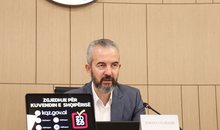
 Flash News
Flash News
Young woman in Korça who denigrated minors on Instagram is hit with a water glass
Conviction charges in Greece: The Prosecution says it has been verifying the "Gjoka" case for 1 year
27-year-old drunk driver hits police officer in Peshkopi
SPAK files another charge against Ajola Xoxa, also accused of concealing income
Young man disappears in Tirana
Rama announces the closure of Tik Tok without explaining how, expert: It violates freedom and the right to information
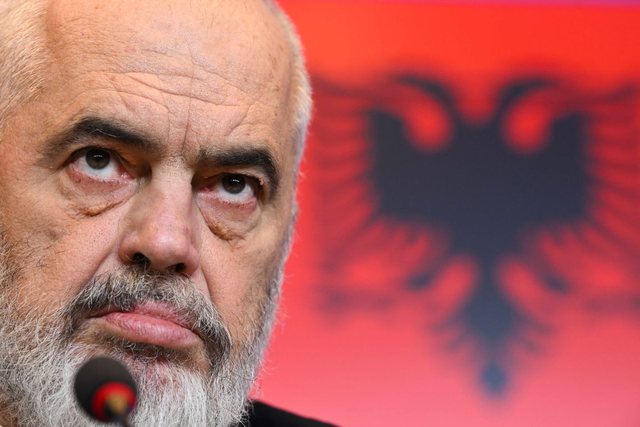
Prime Minister Edi Rama declared on Saturday that he would “close Tik Tok”, the social network whose widespread use by children has raised many concerns, but which, despite this, no democratic country has taken any action to close. Rama spoke at an event on school safety after his government came under public pressure following the murder of a child at a school in Tirana. He rejected suggestions that his government was responsible for the lack of safety in schools and more broadly in Albania, and last month declared that he would launch a public discussion on the closure of Tik Tok and Snap Chat, two social networks. On Saturday, December 21, Rama declared the consultation closed, announcing the decision.
"We will close TikTok for a year. Keep in mind that we have done all our research in terms of technology and it will take us 6-8 weeks from the beginning of next year and for a year we will close TikTok. TikTok will not exist in the Republic of Albania," he declared.
Education Minister Ogerta Manastirliu was only slightly more specific about how, declaring "the blocking of the TikTok platform, based on a package of instruments being worked on by AKCESK and AKSHI."
The opposition immediately declared its position against it, calling the measure “censorship.” Rama, for his part, did not explain on what legal basis and constitutional criteria such a measure could be taken, nor in which other democratic country in the world he drew inspiration.
"Using the murder of a 14-year-old to solve personal problems with social networks that you cannot control is double murder and a serious act against freedom," declared Ina Zhupa, an opposition MP.
Azmer Dulević, an activist with the Albania Becomes Movement, commented after Rama’s statement that Tik Tok, in his opinion, is the only media outlet that Rama cannot control, while calling Rama’s move pointless because such closures can be easily avoided with VNP, a technological trick used in dictatorial countries where governments block access to the internet on any critical website. “Are you going to close Tik Tok, the only outlet you cannot control until the elections are over?” he commented. “Don’t forget that we also have VNP,” he added.
Rama's plan to shut down Tik Tok may ultimately be unconstitutional and in conflict with a landmark decision by the European Court of Human Rights.
According to Flutura Kusari, a freedom of expression expert at the European Center for Press and Media Freedom, "the complete closure of social media platforms is disproportionate, an extreme measure and difficult to justify."
“The European Court of Human Rights has already ruled in several cases that the complete closure of such platforms constitutes a violation of freedom of expression. If I am an academic researcher, activist or journalist and I only use Tik Tok to disseminate information on topics of public interest, the closure of the platform would constitute a direct violation of my freedom and right to receive and impart information. Therefore, the Albanian government must balance the protection of children and the public with the right to freedom of expression and not find quick fixes that will have negative consequences on the exercise of freedom of expression,” Kusari added.
According to Kusari, the concern is that "closing Tik Tok will create a precedent that could later be used to close Facebook, Instagram or Twitter."
Albania debated extensively four years ago another controversial initiative of Rama’s, the law on online media control, presented by him as an “anti-defamation package”, one of the aspects of which was the threat that a media outlet could be closed if it did not obey an administrative order about which there was a complaint. One of the arguments why these laws were unconstitutional, and in the final instance they could not be approved despite Rama’s many years of insistence, was that on a website there is a variety of information and, although one of this information may be illegal, the rest of the page cannot be blocked.
Turkey is the country that has blocked the social network YouTube in the past and was condemned by a decision of the European Court of Human Rights precisely because some activists complained that they had been denied freedom of expression.
The country with the most extreme move to date in this area is Australia, where a law has banned social media in its entirety, rather than a specific platform, for children under 16, and questions have been raised about how Australia can enforce this law. In no case has Australia blocked any social media for adults./ BIRN
Latest news


Topalli: Small parties have no chance of getting a mandate
2025-05-05 22:42:40
SP officials in prison for corruption, Rama: We are not a law firm
2025-05-05 22:36:42
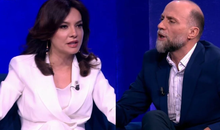

Soul-touching hours: Discover when we are saddest and happiest during the day
2025-05-05 21:47:20
Alimehmeti: DP in Tirana gets more than 12 mandates
2025-05-05 21:34:33
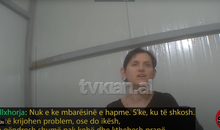

Berisha: Rama knows Dibra as much as Toni Gogu knew Hajredin Pasha
2025-05-05 21:01:00





27-year-old drunk driver hits police officer in Peshkopi
2025-05-05 19:50:14
'Giro d'Italia' in Albania, how will vehicle traffic be diverted in Tirana
2025-05-05 19:36:32
Meta: Rama is afraid of losing, that's why he calls for non-participation
2025-05-05 19:25:19


Këlliçi: Let's stop propaganda and return Tirana to the citizen
2025-05-05 18:43:47
Rama deepens scandal, calls again for election boycott
2025-05-05 18:25:53


Indian learns 80 numbers in 13.5 seconds, becomes world champion
2025-05-05 17:50:22

The moral damage of promises, an electoral bubble
2025-05-05 17:23:59
Albanian arrested in France, caught with 11 kg of cocaine
2025-05-05 17:08:22


The best and worst foods for a healthy liver
2025-05-05 16:41:45
Another country lifts visa requirements for Kosovo
2025-05-05 16:28:49



Judicial confrontation with OSHEE, Bardhi is declared innocent
2025-05-05 15:50:40
Bozdo: The panicked SP is preparing vote buying
2025-05-05 15:41:06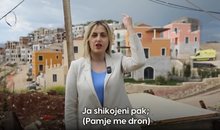
Zhupa publishes drone footage: DP will cancel the strategic investment law
2025-05-05 15:37:29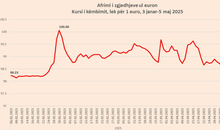

The week starts badly for 3 zodiac signs, here's what the stars predict!
2025-05-05 15:13:53
73-year-old arrested for wounding brother in Malësia e Madhe
2025-05-05 15:04:20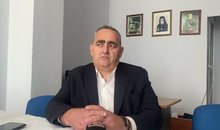

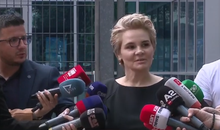

Jonathan Islam falls from a parachute
2025-05-05 14:36:21

Lawsuit filed against Dodik, accused of insulting Bosniaks
2025-05-05 14:12:48


Topalli denounces SP officials: They are manipulating votes in Greece and Italy
2025-05-05 13:49:25
Monika Kryemadhi appears at SPAK dressed in black
2025-05-05 13:24:47


SPAK files another charge against Ajola Xoxa, also accused of concealing income
2025-05-05 12:52:23
Sanctions and war tribunal on the agenda of EU ministers
2025-05-05 12:29:10
Rama insults and offends Bledjon Nallbatin: How can Democrats vote for a thug?
2025-05-05 12:21:41

May 5, National Martyrs' Day
2025-05-05 11:50:22

Kurti invites LDK for coalition with LVV
2025-05-05 11:37:27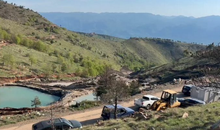

Young man disappears in Tirana
2025-05-05 11:14:39

Facebook campaign: Profiles from Vietnam like "Team Edi Rama" posts
2025-05-05 10:52:24
The Special Court leaves Florenc Çapjan in prison, the testimony is revealed
2025-05-05 10:38:24
Fatal accident in Shkodra
2025-05-05 10:25:30
Gunfight in Laç/ One of the injured in serious condition
2025-05-05 10:19:06




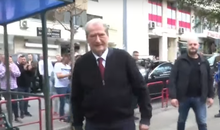
Appears in SPAK Sali Berisha
2025-05-05 09:08:23
Përtej gallatës dhe nofkave, çfarë ofron politika për ekonominë
2025-05-05 08:52:58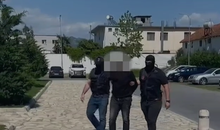
A 28-year-old wanted by Spain for drug trafficking is arrested in Vau i Dejës
2025-05-05 08:42:24

Rain is back! Weather forecast for today
2025-05-05 08:20:40
Posta e mëngjesit/ Me 2 rreshta: Çfarë pati rëndësi dje në Shqipëri
2025-05-05 08:01:22

Makina përplas motorin në aksin Shkodër-Lezhë, plagosen dy adoleshentë
2025-05-04 21:29:50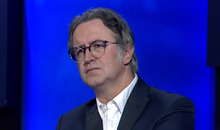

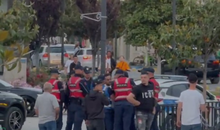
Video/ The moment when the police forcibly drag away the DP candidate in Fier
2025-05-04 20:47:17
Berisha: We ask for 100 days from Albanian citizens to transform Albania
2025-05-04 20:38:25



"In the owl sleeps a vigilant fate..."/ Chris LaCivita openly criticizes Rama
2025-05-04 19:09:01
UEFA fines Real Madrid
2025-05-04 18:45:40

Habit Putin: I hope there will be no need to use nuclear weapons in Ukraine
2025-05-04 17:55:59
A 37-year-old man is found dead in the Port of Shëngjin
2025-05-04 17:32:32
Serious accident in Croatia, 2 dead and 31 injured
2025-05-04 17:17:05
Useful during the summer, here are the vitamins you should take
2025-05-04 17:03:11

